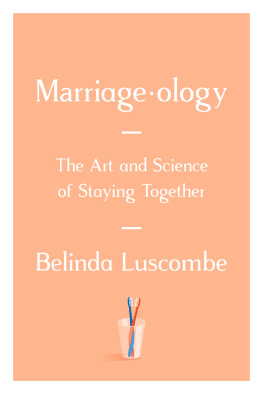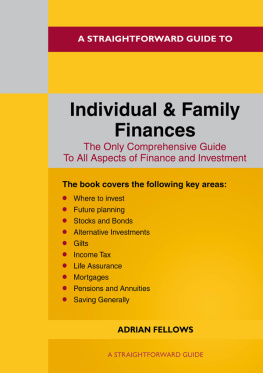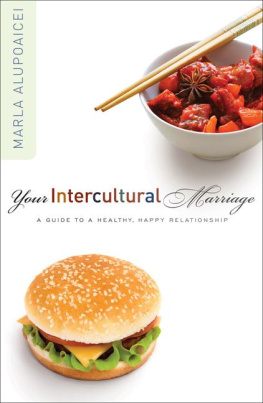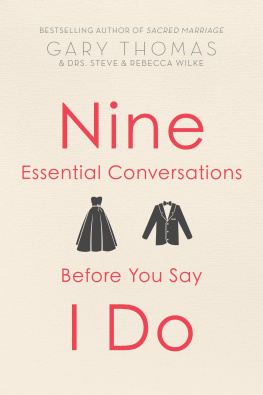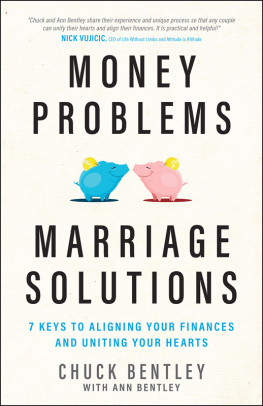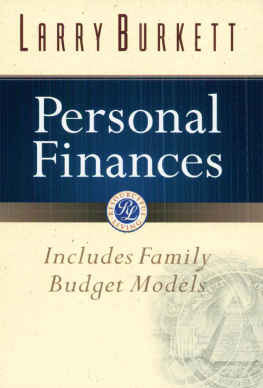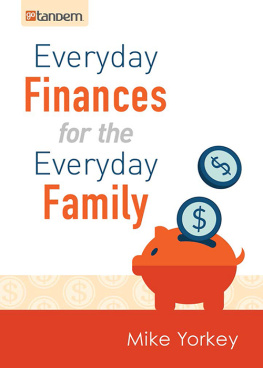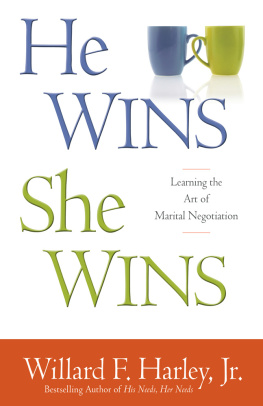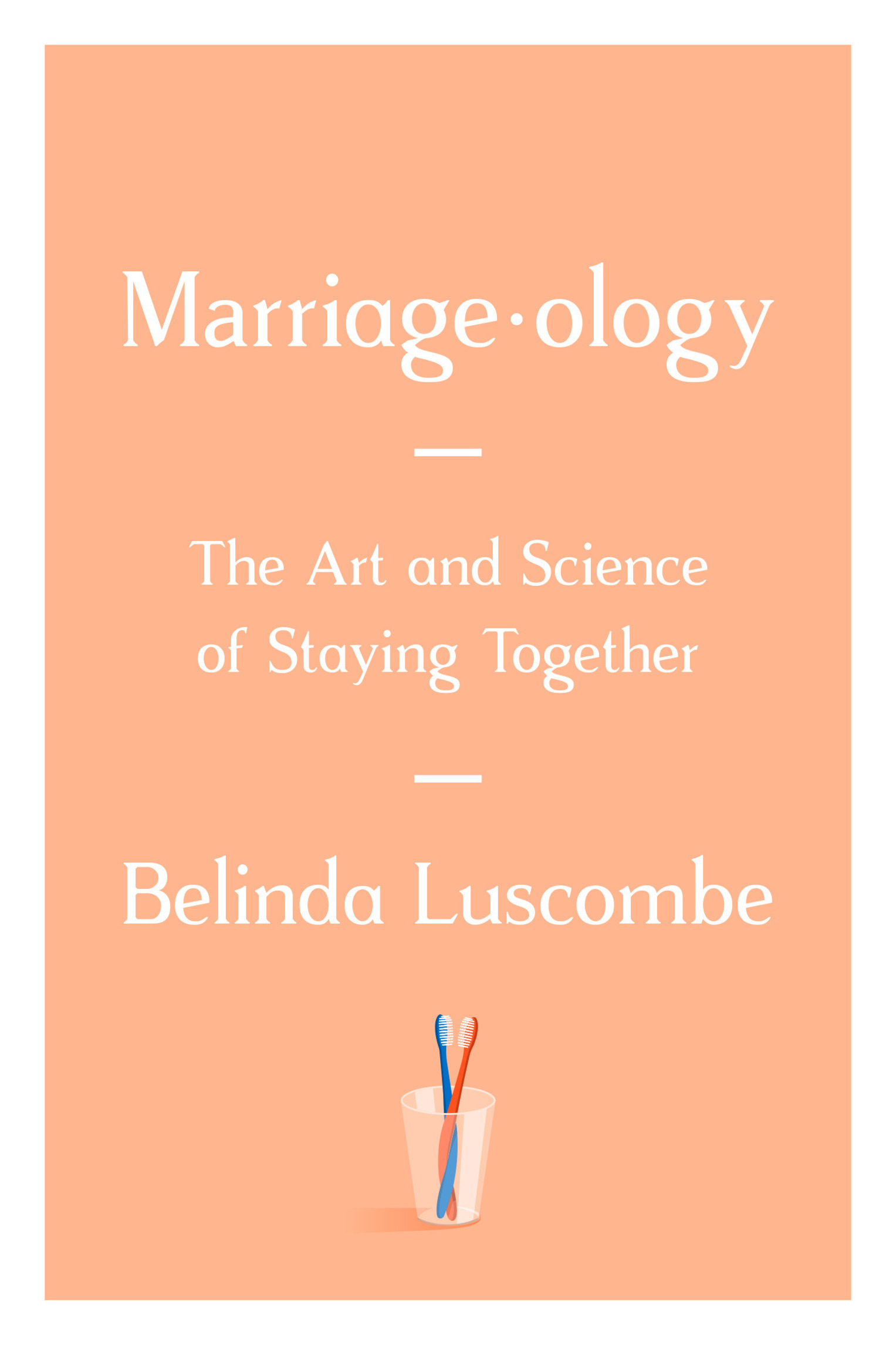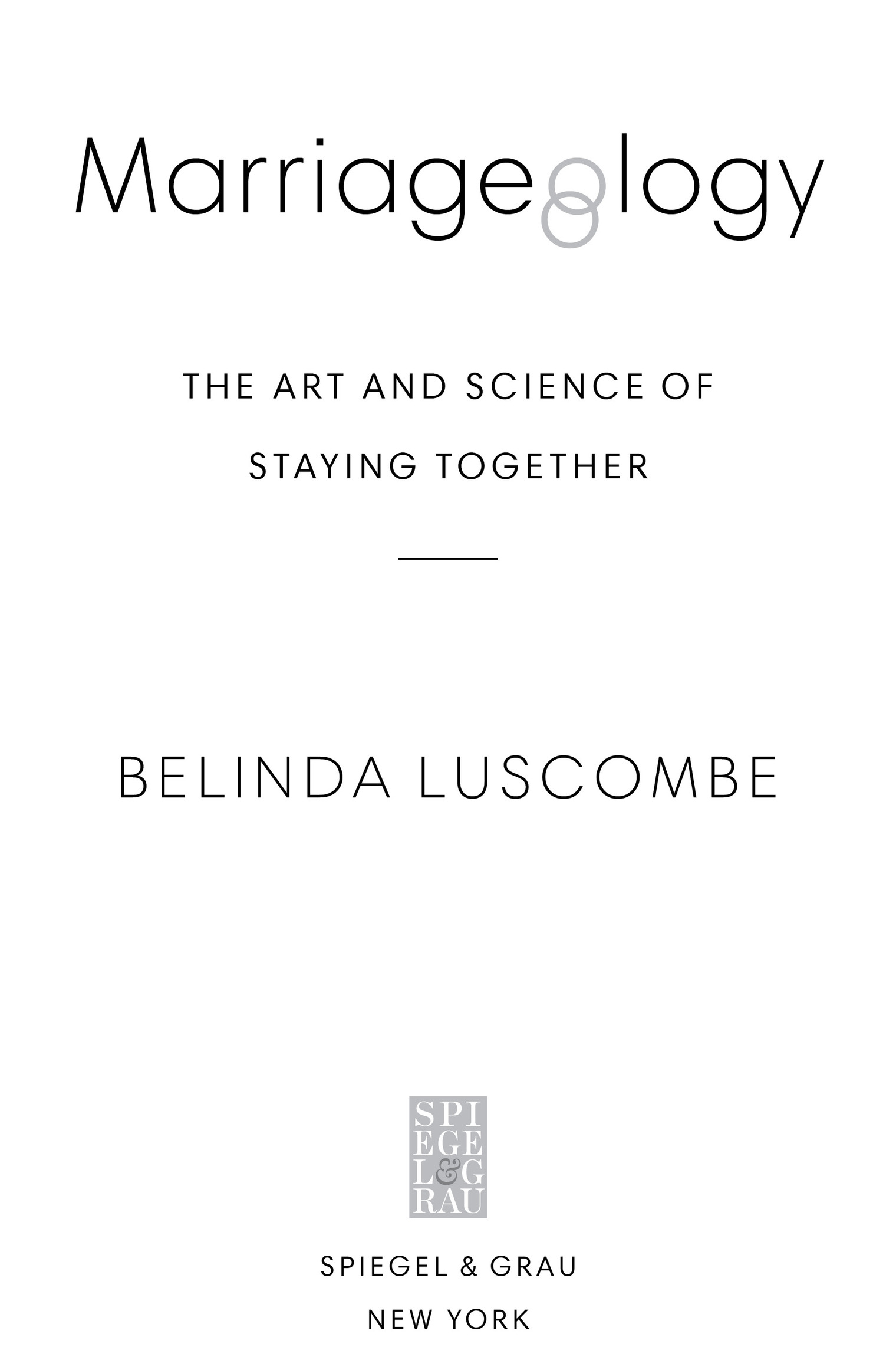Contents
Landmarks
Print Page List
Copyright 2019 by Belinda Luscombe
All rights reserved.
Published in the United States by Spiegel & Grau, an imprint of Random House, a division of Penguin Random House LLC, New York.
S PIEGEL & G RAU and colophon is a registered trademark of Penguin Random House LLC.
The appendix, from The Experimental Generation of Interpersonal Closeness by Arthur Aron, Edward Melinat, Elaine N. Aron, Robert Darrin Vallone, and Renee J. Bator from Personality and Social Psychology Bulletin (1997) 23, 363377, is reprinted by permission.
LIBRARY OF CONGRESS CATALOGING-IN-PUBLICATION DATA
Names: Luscombe, Belinda, author.
Title: Marriageology : the art and science of staying together / by Belinda Luscombe.
Description: First edition. | New York : Spiegel & Grau, [2019] | Includes bibliographical references.
Identifiers: LCCN 2018029424 | ISBN 9780399592362 | ISBN 9780399592379 (ebook)
Subjects: LCSH: MarriagePsychological aspects. | CouplesPsychology. | Interpersonal relations. | Man-woman relationships.
Classification: LCC HQ734 .L87 2019 | DDC 306.81dc23
LC record available at https://lccn.loc.gov/2018029424
Ebook ISBN9780399592379
spiegelandgrau.com
randomhousebooks.com
Book design by Dana Leigh Blanchette, adapted for ebook
Cover design: Greg Mollica and Anna Kochman
Cover illustration: Anna Parini
v5.4
ep
Contents
Heart, are you great enough
For a love that never tires?
ALFRED, LORD TENNYSON
Marriage is a wonderful institution, but who wants to live in an institution?
AUTHOR UNKNOWN, BUT NOT TENNYSON
INTRODUCTION
Have you ever noticed how we celebrate marriage backwards? Wedding: big blowout party before heading off to lavish vacation. First anniversary, special and exciting, you might even get a note from relatives and friends. Second anniversary, dinner and a gift. And so it goes, with a traditional designated gift category (third: leather, fifth: wood, tenth: tin) until you get to fifteen years, for which the traditional gift is crystal. After fifteen, tradition no longer dictates an annual present. Youre on your own, giftless, all the way to twenty, when you get china, which is less expensive than crystal. Then at thirty, the category is pearl, which basically means only the wife is receiving a gift.
This is all turned around. Any fool can be married for a year. You can get to three years on the fumes of the honeymoon alone. The time you really start to need wedding gifts is fifteen years in, when the novelty of having someone around all the time has worn off. Cutting off the presents at fifteen is like cheering people on for only the first half of a soccer game or until mile ten of a marathon. Those are the easy parts.
I was reminded of this backwardness when an old friend called. We hadnt spoken for a few months and he wanted me to know that he and his wife of twenty years were separating. They wanted to make it a really positive experience, he said, so they were going to live in the same house. They were still going to cook food for each other and do things together. Eventually they would separate their finances. They still loved each other, he insisted, they just couldnt be married. He pointed out that a mutual acquaintance was doing more or less the same thing.
This is now how marriages die: not in some fiery car crash of hatred, epic shouting matches, and slammed doors, with bloodied survivors staggering out of the smoking wreck into the arms of an EMT. Modern marital splits feel more like euthanasia in a high-end veterinarians office. After a prolonged discussion about quality of life, the decision to end the union is made gently and with all the goodwill in the world, to put it out of its misery, much as an aged family pet is put down after his kidney function becomes unreliable and he keeps ruining the carpet. Its not done to rage against the dying of the marital light; conscious uncoupling is the thing.
My friend grieved, sure, but mostly he was embarrassed; it wasnt his first marriage. He has a grown son with his prior wife and he worried about what that son would think of him. As he talked about it, I got the impression that it felt to him more like losing a job than a family member. Or being careless with his credit card and getting scammed. Again? Geez, whats wrong with me?
Nobody likes to put it like this, but it is natural for marriages to fail. They can feel like the emotional equivalent of shoveling snow; people start strong and committed, but it takes so much more out of them than they expect. It is natural for people to get fed up with their marriages. It is natural for food to spoil, for a fire to go out, for enthusiasm to wilt.
After all, there is no bigger, no riskier, no more intimate decision a human makes than to say this is the person with whom Im going to spend the bulk of my breathing time. This is the person with whom Im going to create more humans. This is the person whose welfare I will now take into consideration in almost any decision I make. This is the person whose fortunes will affect mine, whose jokes and stories I will have to hear as long as I still have hearing, whose shoes will always be in my bedroom closet, whose hair will forever clog my drain.
In the era of the start-up, of the pop-up and the flash mob, a relationship thats supposed to last a lifetime can seem like an anomaly. Its too permanent. It doesnt lend itself to disruption. It does not allow you #failfast or upgrade. Youd think wed have discarded it with all the other no-longer-useful human inventions like the walking plow and the fax machine and waiting a week for the next episode to arrive on TV.
But while its natural for marriages to disintegrate, it is not inevitable. Nor is it desirable. We know how to keep food until we need it, or to tend a fire, or to motivate people. With some careful attention, nature can be surmounted.
And marriage, that fusty old institution, is worth fighting for. There is within most of us a deep desire to be in an intimate relationship with another person. Not to just have a playmate, but the full megillah, a husband or a wife or another warm body who is only ours and who cares for us as for no other, and who has promised to accompany us for the whole journey, all the way to the end of the map. Surveys show that getting married is still overwhelmingly the dream of young people (men and women alike). Lovers who move in with each other and like it usually still make it official, even though they dont need to. Marriage is so central to our conception of happiness that huge legal battles are being waged to this day to figure out whether people of the same sex may participate in it.
Thats because, like a lot of things that go against naturedriving, scuba diving, pink haira marriage that lasts can be amazing. Life-changing, enriching, thrilling. Completely worth it.
But nobody scuba dives without help or instructions. Marriage, which has been historically so much more likely to fail than an oxygen tank, is the same.
Ive been writing about and researching marriage for more than a decade for Time magazine. Ive always found the subject fascinating because nearly everybody has a story about the institution that is central to their liveswhether its their own marriage or their parents or their childrens or their best friends or even their lovers. Marriageby which I mean any exclusive lifetime commitment to one other soul, whether made official by the state or church or just between yourselvespushes people to the extremes: humans can become their best selves, capable of great empathy and sacrifice. Or they can transform from nice regular neighbors into people capable of spectacularly petty and vengeful behavior.

